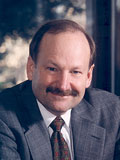Ralph Ungermann

Ralph Ungermann has been described as a genius and visionary in the field of computer networking. From his early days at Collins Radio where he oversaw operation of a local and wide area network that predated commercial LAN/WAN technology by a decade, he has been at the forefront of computer communications throughout the early history of networking systems architecture.
Ungermann received a B.S.E.E from University of California, Berkeley and his Masters in Computer Architecture from the University of California, Irvine. He then joined Collins Radio in 1967 where he was responsible for the LAN portion of the MOS factory in Newport Beach, CA. In 1970, he left Collins for Western Digital to help develop and bring to market the first UART chip. He then took a job with Intel reporting to Federico Faggin. At Intel, he was responsible for microprocessor development and his team developed the USART and the I/O chips.
During the economic downturn of 1974 Ungermann and Faggin left Intel, with plans to start a business together. They were soon approached by Exxon Enterprises, which persuaded Ungermann and Faggin to start Zilog, Inc. that same year to develop microprocessors and communication chips. By 1978, Zilog was growing rapidly on the success of their Z-80 microprocessor and communication and I/O chips. Despite their success, in 1978, Exxon decided to “fold” their investments in computer companies together; an idea strongly resisted by Ungermann. Due to the rift between Ungermann and Exxon management, he was asked to leave at the end of 1978.
Expecting such an outcome, Ungermann had already begun exploring his options, and in July 1979, Ungermann and fellow Zilog ex-employee, Charlie Bass, incorporated Ungermann-Bass (U-B). With the aid of new engineers, especially John Davidson, and a marketing and sales executive, James Jordon, they closed their first round of venture capital financing of $1.5 Million. Ungermann crafted a vendor independent networking strategy that required U-B to master the breadth of Ethernet, Token Ring, even Token Bus and broadband technologies. To do so required U-B to acquire other companies, such as Amdax in January 1983 and Linkware in February 1986. Ungermann’s strategy would also require U-B to always have excess capital on hand: it became the first Ethernet LAN company to go public, for example, raising $28.5 Million of cash on June 23, 1983 with a valuation of $288 Million.
In June of 1984, U-B proposed to General Electric a MAP (Manufacturing Automation Protocol) joint venture. In October, despite skepticism from their own board, Ungermann and Jordan succeeded in closing the deal: in October 1984, Industrial Networking, Inc. (INI) was created with great promise. At around the same time U-B also released their PC product, Net/One. Ungermann’s vendor-independent strategy seemed prescient; but sales were flat and in March 1985, U-B reported a $2M loss. U-B’s focus on large-scale high-end network services for large, mainframe businesses left them late to the game of PC networking. Their financial woes were exacerbated by the Stock Market crash of October 1987 and in early 1988, Ungermann pursued talks with Tandem Computers, reasoning that an association with a large and reputable computer manufacturer would give them the stability they needed to reach bigger clients. In February 1988 Tandem acquired U-B for $260 Million. Ungermann became a Vice-President and Board Member of Tandem.
In this interview, Ungermann sheds light on some of the key strategies and decisions that led to success or failure for the companies he worked for and ran, and those he competed against. His discussions focus more on overall business strategies than they do on management decisions and the personnel. They reveal a leadership style motivated by a strong desire to compete on a level equal to the major players of the day: this goal of achieving a market position on par with IBM, DEC and AT&T, is clearly evident in the discussion of his decision to merge U-B with Tandem, which had only just been finalized in the months preceding this interview.
Keywords: Collins Radio, Western Digital, Intel, Zilog, Ungermann-Bass (UB), Industrial Networking, DCA, Tandem Computer